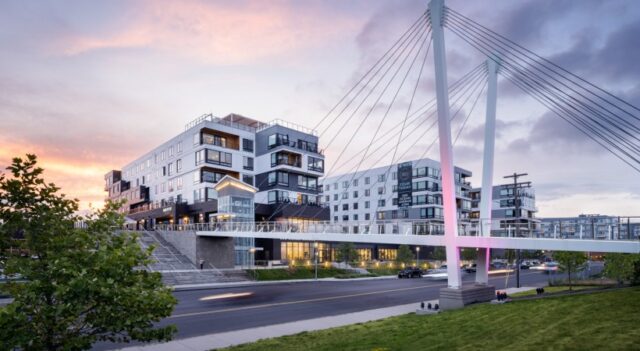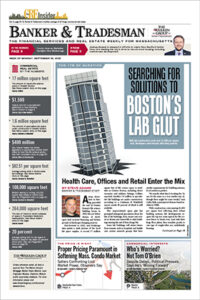
Transit and highway connections have helped draw market-rate developers to Revere Beach’s many empty parking lots in recent years. Photo by James Sanna | Banker & Tradesman Staff
The city of Revere has a development problem that many of Massachusetts’ Gateway Cities can only envy.
In recent years, Revere has seen the construction of thousands of new apartment units and the opening of new hotels, restaurants and shops, the vast majority of them along or near Revere Beach.
The oceanfront city of 53,000 people just north of Boston is also home to a growing list of huge commercial sites – the former Suffolk Downs and Wonderland racetracks and the old NECCO candy factory, among them – that have either been redeveloped or are in the long-term process of being reimagined, generating potentially thousands of jobs in the process.
Known for years as an economically hardscrabble and underperforming city, Revere is on a roll these days, even during a pandemic and economic downturn that’s hobbled redevelopment efforts in other communities across the commonwealth.
So, what’s the problem? Revere’s development activity has been so intense and rapid of late that many are concerned that it may one day squeeze out many of its largely immigrant and working-class residents, replaced by white-collar professionals attracted to Revere’s comparatively cheap housing, beachfront amenities and easy access to Boston via car and public transit.
‘It’s the Biggest Challenge’
Revere isn’t going to be confused with Newton or Wellesley anytime soon, but housing affordability and future gentrification are growing concerns in Revere, city and community leaders agree.
“Housing affordability is a regional problem that’s hitting Revere and other [cities and towns] as well,” says Rafael Mares, executive director of The Neighborhood Developers (TND), a Chelsea-based nonprofit community development corporation. “The issue is not new development in Revere, but the lack of building enough affordable housing in the city.”
Unlike nearby communities such as Somerville and Medford, Revere does not require developers to include a percentage of affordable units in large-scale multifamily projects.
Revere Mayor Brian Arrigo and Robert O’Brien, director of strategic planning and economic development for the city, say they’re aware of affordability concerns, and they say aggressively pursuing affordable housing is next on their to-do lists.
“It’s the biggest challenge confronting us,” Arrigo says of balancing the need to promote commercial and high-end residential development while at the same time making sure Revere stays affordable for many of its long-time, less-affluent residents.
In a way, the city’s development activity, assuming the city does build more affordable housing in coming years, is going as originally planned: Allow market-rate apartment buildings, hotels, offices and retail shops to be built in order to improve the city’s tax base and generate jobs – and then tackle affordable housing.

The 305-unit 500 Ocean project was the second of three Revere multifamily projects by Boston-based Gate Residential. The developer is nearing completion of the third, the 127-unit Ryder complex at 21 Revere Beach Blvd. Photo courtesy of Robert Benson Photography
A Multifamily Magnet
Revere trails only Quincy in Massachusetts’ suburban multifamily production since 2016, according to a survey released this month by RentCafe.
Since Arrigo took office in early 2016, about 2,800 apartment units have either been built or are currently under construction in Revere, via 28 separate development projects totaling about $750 million. And that doesn’t include the planned 1,400 housing units coming to Revere via the future redevelopment of the old Suffolk Downs racetrack, city officials say.
O’Brien stressed that recent residential development projects have largely proceeded on vacant land and parking lots along or near Revere Beach.
“Not one of those new units displaced existing units,” O’Brien said.
Many of the new units have been built at the massive Waterfront Square project, the transit-oriented, multi-phase redevelopment of six parcels along Revere Beach, four of which have already been developed into market-rate residential buildings.
Construction is under way on two additional Waterfront Square parcels – one for a 170-room hotel and the second for another apartment building being constructed by a development team of Hines, Belfonti Cos. and Bridge Investment Group.
Kyle Warwick, principal at Redgate, is one of the many developers who has been especially busy in Revere in recent years.
Redgate’s first project was the 195-unit One Beachmont, across from Suffolk Downs and finished in 2019. The 305-unit 500 Ocean project, located right at the Wonderland MBTA bus and subway station, opened in April 2020.
And the first phase of the “Ryder” project, at 21 Revere Beach Blvd., is expected to open with 127 units in February. A second phase, with 70 additional units, is scheduled to be completed this spring, said Warwick.
“We’re looking at more projects,” said Warwick, who declined to give details. “We love Revere. We love the Blue Line. We love the beach. It’s really those two things that we’re selling – the T and the beach.”
He said the pandemic has hurt the rental market in Revere, as it has elsewhere, as many young professionals initially pulled back from rentals amid economic turmoil. But they’ve recently started “to peek their heads out” again and Warwick said he’s confident the rental market will rebound.
Not a ‘Contentious’ City
It’s not just residential buildings going up in Revere.
Budge Upton, a partner at Upton Partners, said his firm is involved in the development of the new SpringHill Suites by Marriott hotel project at Waterfront Square, adjacent to the Wonderland T station.
Upton’s firm has been involved in a number of past development projects in Revere, including the 233-unit 650 Ocean Ave.
He praised city officials for being open to new development and flexible in their demands.
“It’s not been a contentious place to do business,” Upton said, adding his firm is exploring other potential projects in Revere.
John Migliozzi, executive vice president at East Boston Savings Bank, said business activity in general has slowed in Revere and elsewhere due to the pandemic. But he said it’s impressive that so much development activity has managed to move forward during the coronavirus crisis in Revere.
“Revere Beach has just really taken off,” he said. “We think more off-beach development is also on the way. It’s all building momentum.”
Not that all developments in Revere have been high-end ventures.
TND is currently constructing 51 units at 571 Revere St. – all of them subsidized units – and is expecting to open the residential building this spring.
But TND’s Mares notes his organization has received 1,400 applications for the units, a sign of just how much demand is out there for affordable housing units. The bottom line, Mares says, is that more subsidized units are needed in Revere.
Arrigo, Revere’s mayor, said he’s confident more are on the way.
“There are other parking lots in Revere waiting to be developed,” he said.





